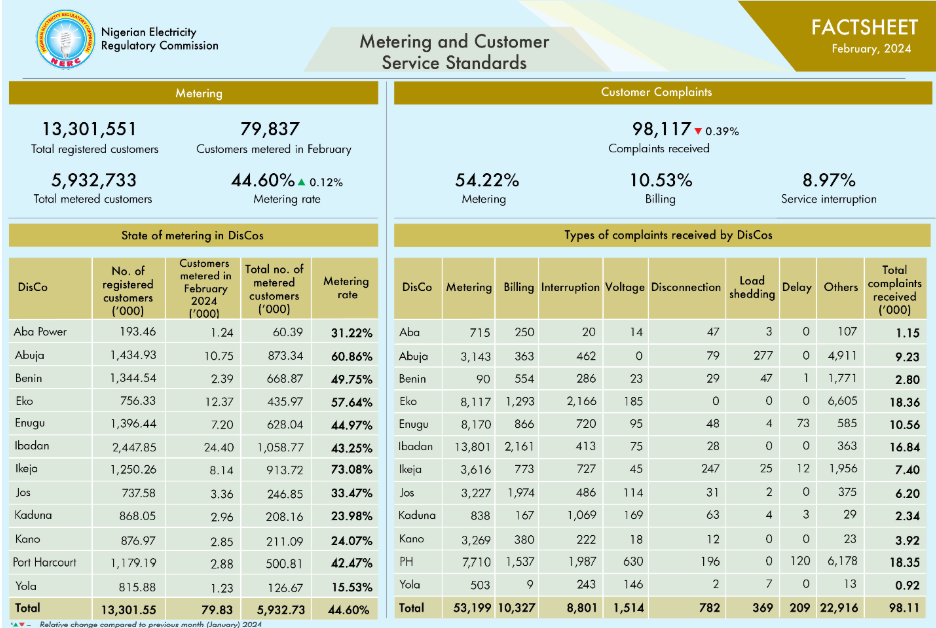Recent data indicating an uptick in complaints regarding metering issues has made the
deregulation of meter supply a welcome idea (to me, at least). In the February report of the
Nigerian Electricity Regulatory Commission (NERC), complaints around metering issues
constituted 54% of complaints from end-users compared to 20% in 2023.
Data like this has reinforced my belief in a fresh framework for deploying electricity meters.
Today, NERC has dismantled the regulated, constrained supply market of electricity meters,
opening the door for licensed Metering Asset Providers (MAP) to supply their “goods” across
DISCO territories nationally.
This allows MAPs to provide meters to any end-use customer based on DISCOs’ specifications on a willing-buyer, willing-seller basis. This latest development will unarguably enhance the penetration of metering assets for reduced ATC& C, improved billing, and collection in NESI.
The deregulation of the final cost of the meter and its supply offers an avenue for increased availability and the associated increase in the metering rate, which currently stands at about 44% of total electricity customers.
However, this new development should not be considered the “almighty” formula for solving our
metering equation. Aside from its potential for increased metering costs, the order stipulates
measures in the form of fines for late meter supply from the payment date.
This leaves a loophole because MAPs may simply not receive the end-users payment for the metering device until they can guarantee the date of supply. In hindsight, the low metering rate has evidenced DISCOs’ failure to evolve and proffer solutions to decade-long systemic issues.
Improvements in metering in NESI have primarily been through the unending and expensive interventions of the federal government aimed at ensuring near-universal metering of electricity end-users. The capital investment in the distribution network by DISCOs has been subpar arguably, partly because of illiquidity in the NESI.
Most DISCOs have failed in infrastructure expansion, network improvement, service
provision, asset maintenance, metering, etc., as mandated as part of the privatization a decade
ago. Many of the developments in the distribution networks were made by individuals, collectives
(estates, communities), state governments, and political office holders.
The federal government has developed and implemented policies like the National Mass Metering Program to shore up the number of metered customers. It instituted an SPV—The Meter Access Fund—with over N30 billion for the “collaterization” of local metering companies.
However, DISCOs have yet to reciprocate this government support for their business by
matching corporate actions in capacity development and capital injection, even though metering
is supposed to be the sole responsibility of DISCOs. There is a notion that the DISCOs benefit
from the lack of installed meters as this offers loopholes for sectoral transparency and empowers
the controversial estimated billing for unmetered end-users, allowing DISCOs to accrue revenue.
Another perspective is that the NESI’s illiquidity, partly due to the metering gaps, impeded
DISCOs’ ability to invest needed capital into developmental plans. DISCOs can facilitate a “push” methodology for universal metering rather than the current “pull”
by customers.
This will require intentional corporate action from DISCOs and substantial capital
investment, which the DISCOs claim not to have. However, this same strategy can help shore up
liquidity through loss prevention—a classic case of chicken and egg, in my opinion.
Through various sources, DISCOs should explore the opportunity to finance the procurement
of meters installed for end-users at no upfront costs. The lease, insurance, maintenance, and operational costs are billed to the end user as part of its consumption cost.
customized strategies and solutions to improve end-user metering rates within their networks.
This can include categorizing meter supply, which is feasible in a push system.
The new state-level electricity framework dispensation allows DISCOs to improve the metering
rate through liaison and collaboration between the state government and state-level subsidiaries
(Subcos). The state government can help fund meters, incentivise, and provide
the sectoral liquidity issue and losses to be minimized to an acceptable level (yes, you can not
eliminate losses 100%). Therefore, sectoral players (DISCO, TRANSCO, GENCO) must be
active instead of doing little to effect changes to improve the metering rate.
by IPPs, some of this capital can be re-injected/invested to improve metering for sustainable
revenue and profit flow.
The continuous dependence of the sector on the federal government, with the political bias of
“impressing and pacifying” the populace to vote to keep financing and aiding the improvement of the electricity metering rate is preposterous and tantamount to cheap blackmail.
favours not the bottom of the societal pyramid and continuously takes a significant financial toll
on the government balance sheet must be halted.
ending this absurdity and coercion of the sector. More feasible and sustainable actions are
required to get the industry to a level of normalcy in terms of metering.

Bayode Akomolafe writes from Stoney Creek, ON, Canada. He is a registered Power
Engineering professional with over 14 years of experience working in the power sector across
multiple world countries. He specializes in Engineering project development, technical
advisory, sustainability management, macro-energy consultancy, strategy, and policy
development.
Dear NERC,
I am writing to express my concerns regarding the recent significant increase in electricity tariffs within my locality, specifically within the Tunfure Community of Akko LGA, Gombe State. The sudden and exponential nature of this increase has left me bewildered and seeking clarification.
It is particularly troubling to learn that Tunfure appears to have been singled out for such a substantial tariff adjustment. I am compelled to inquire as to the rationale behind this decision and to understand why our community has been targeted in this manner.
I respectfully request that this matter be thoroughly reviewed and reconsidered. Your attention to this issue is greatly appreciated.
Thank you for your time and consideration.
Sincerely, Samuel Mson